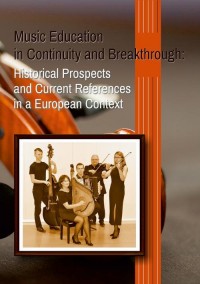Music Education in Continuity and Breakthrough: Historical Prospects and Current References in a European Context

| Dane szczegółowe: | |
| Wydawca: | Naukowe Akademii Pomorskiej w Słupsku |
| Format: | |
| Ilość stron: | 290 s. |
| Zabezpieczenie: | plik z zabezpieczeniem watermark |
| EAN: | 9788374672726 |
| Data: | 2025-01-24 |
Opis e-booka:
On 16-18 October 2014, the Pomeranian University in Słupsk hosted an international conference entitled: “Music Education in Continuity and Breakthrough: Historical
Prospects and Current References in a European Context”. The main objective of the project was to initiate broad discussion on the historical origins of music education, and the ways in which it is reflected in the contemporary education systems of the Central European countries. The Institute of Music at the Pomeranian University in Słupsk entered into cooperation with several European universities, among which the German partner – the University of Würzburg – was the most important. The main representatives of both academic centres, who are also the editors of this selection of papers: Dr. Jarosław Chaciński and Prof. Friedhelm Brusniak, decided that the life, the teachings and the music activities of Eberhard Preussner (1899-1964), the Słupsk-born President of “Mozarteum” in Salzburg in the years 1959-1964, were an important premise for formulating the ideological assumptions of the conference. A refection on the richly detailed biography of this figure and his life-journey (from Słupsk through Berlin to Salzburg), as well as on the abundance of topics and the universal quality of music and teaching ideas since the beginning of the 20th century, triggers a number of stimuli to undertake broad-ranging dialogue about the value of cultivating and teaching musical arts (Ze Wstępu).
E-book „Music Education in Continuity and Breakthrough: Historical Prospects and Current References in a European Context” - Wydawca: Naukowe Akademii Pomorskiej w Słupsku. Cena 36.75 zł. Zapraszamy na zakupy! Zapewniamy szybką realizację zamówienia.
Spis treści:
Introduction 7
ANDRZEJ MICHALSKI
The historical outline of educational ideals in Polish music pedagogy 15
VIOLETTA PRZEREMBSKA
Pedagogy of Sergiusz Hessen as applied philosophy of values and its importance for the modern aesthetic education 27
JAROSŁAW CHACIŃSKI
Leo Kestenberg and Eberhard Preussner from the perspective of Polish culture pedagogy and music education – similarities, differences and inspirations 37
ALICJA KOZŁOWSKA-LEWNA
Modern strategies for shaping of hearing in case of general education system children 59
ELŻBIETA FROŁOWICZ
Music education in early education classes – between aesthetic and praxial concept 77
BEATA MICHALAK
Carl Orff’s system in Poland in theory and practice 91
IRENA MEDNANSKA
The music pedagogy as the scientific discipline in the systematics of musicology 105
SLÁVKA KOPČÁKOVÁ
Between aesthetics of music and music pedagogy (on relationships and cooperation in Slovak musicology in the second half of the 20th century) 121
JUDITA KUČEROVÁ
The legacy of the pianist Leo Kestenberg and the representatives of the Brno Piano School 131
GÁBOR BODNÁR
Thirty years in school music teacher training among different circumstances. Life and work at the Music Department of Eötvös Loránd University (ELTE), Budapest 141
EVA KRÁLOVÁ
Musical activities and class climate at elementary school 153
BEATA WRÓBLEWSKA
Joachim Schwarz as a theologian, composer and a pedagogist 169
JOANNA SCHILLER-RYDZEWSKA
Krzysztof Olczak’s Rząpielnik – from the idea to the reception of the piece 191
Part II – The significance of Leo Kestenberg and Eberhard Preussner in the development of general and professional music education and the activation of
the amateur movement 207
Introduction 209
WILFRIED GRUHN
Eberhard Preußner and his role as collaborator and facilitator of Leo Kestenberg’s educational philosophy. The Prussian reforms in a European context 211
ANDREAS ESCHEN
Plea for a revised perception of Kestenberg 221
CHRISTINE RHODE-JÜCHTERN
“There were music textbooks published in the East which were certainly the best that ever existed” – traces of an undiscovered reception of Kestenberg from the immediate post-war period in the Soviet Zone / GDR 233
FRIEDHELM BRUSNIAK
New perspectives of Kestenberg-research: the significance of “Chorgesangwesen” in the life and work of Leo Kestenberg (1882-1962) 247
DAMIEN SAGRILLO
Identity of music teachers in a diverse European context. Problems and challenges 257
Selected Literature 269

